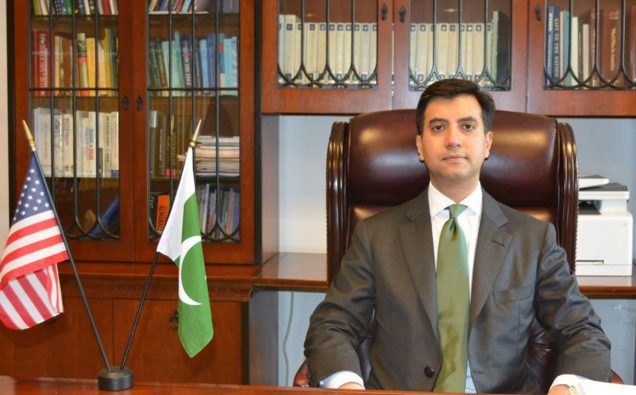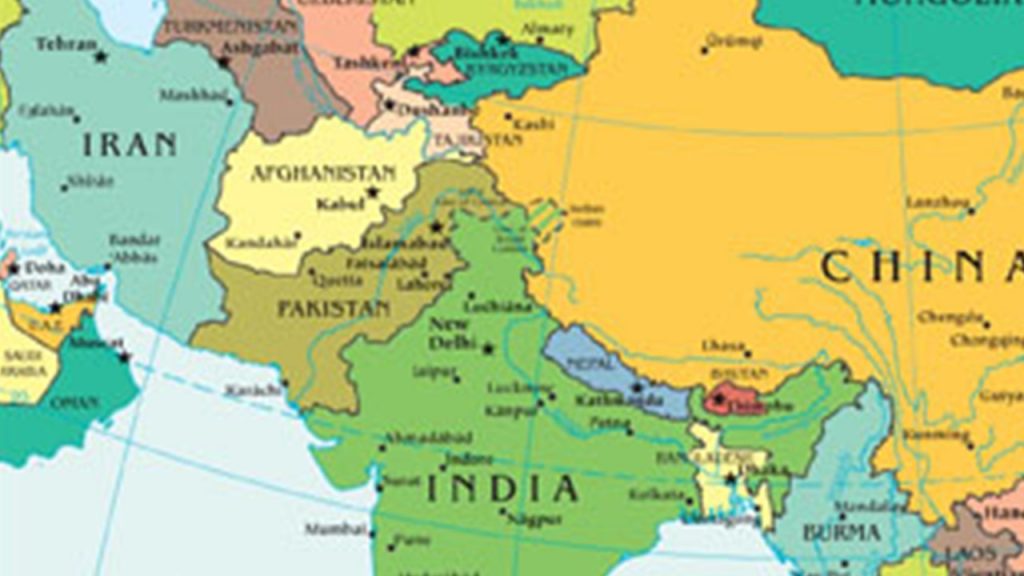
Pakistan’s new ambassador to the United States Ali Jehangir Siddiqui assumed charge of his position on Tuesday at a challenging time when the U.S-Pakistan relations are at a low ebb.
Siddiqui, a banker, replaces retired career diplomat Aizaz Ahmed Chaudhry. During the last days of Ambassador Chaudhry, the U.S. imposed restrictions on the movement of Pakistani diplomats. The step has been interpreted as an apparent tit-for-tat move in the wake of Islamabad’s similar measures, which it says are necessary for security of American diplomats stationed in Pakistan.
Siddiqui is chairman of J S Bank Ltd, and prior to his diplomatic assignment in Washington served as special assistant to Prim Minister Shaihd Khaqan Abbasi. But the PML (N) government ends at the conclusion of its five-year term this week and Pakistan will remain in a phase of political transition in the run up to July 25 nationwide elections. How effective could diplomats in Washington D.C. be in repairing the ties during this transition period?
Meanwhile, the United States and Pakistan have shown no sign of improvement in their strained relationship, which has seen several ups and downs primarily due to the nearly 17-year-old Afghan war on Pakistan’s western border. Last week, Secretary of State Mike Pompeo told Congress that the American diplomats are not treated well in Pakistan. Islamabad has denied the allegation.
The relations nosedived when in a New Year tweet President Donald Trump accused Pakistan of being deceitful in conducting its relationship with the United States. Pakistan has rejected the accusation. Since then, the two countries have held several rounds of talks to address their mutual concerns but have not come out with any concrete outcome so far.
Since forging a strategic alliance in the fight against terror after the 9/11 terrorist attacks, the two countries have worked successfully in a number of areas – like international financial institutions’ support for Pakistan, supply of F-16 fighter jets to the South Asian country and elimination of al-Qaeda militants. But the two sides have not been able to build an effective narrative to market utility and efficacy of the partnership to their people. The discovery of Osama bin Laden in Abbottabad in 2011, the U.S operation to take out the slain al-Qaeda chief and an avalanche of unending Afghan war controversies deepened the trust deficit.
Washington and Islamabad have also had to contend with disappointments from expectations on both sides, particularly on U.S. demands for Pakistani actions against Afghan insurgent groups like the Haqqanis as well as Pakistan’s calls on the U.S. to address its security concerns about Indian role in fomenting troubles in southwestern Balochistan province. India has also openly opposed $ 55 billion China Pakistan Economic Corridor which passing through the province connects Beijing with the Gulf via Gawadar deep sea port. But many in Washington see India as a counterbalance to rising China, complicating the geopolitical scenario. Pakistan, on the other hand, has moved closer and closer to China for economic and military support. Russia has also stepped up its outreach to Pakistan with promises of cooperation. Washington’s relations with both China and Russia have also ebbed further in recent weeks.
New Delhi, meanwhile, upset over the re-imposition of U.S. sanctions against Iran, has declared that it would develop its relations with China and Russia independently of its ties with the United States, which has invested heavily in its relationship with India. New Delhi is committing $ 500 billion to the development of Chabahar sea port in Iran, seen as a move to counter Chinese political and trade advantages that come through CPEC and Beijing’s access via Gwardar port. India’s policy to readjust its priorities means the regional scenario, at best, remains in a flux, raising further stakes for Washington.
“With the way the goepolitical situation, the way it is today, we need partners like Pakistan who are willing to stand with us in very very tough times,” Congressman Jack Bergman, a Republican, told Views and News during the PAKPAC event.
Meanwhile, Pakistani-Americans have shown their vitality to the U.S.-Pakistan relationship. While the Pakistani embassy has not much to show in terms of changing perceptions at the White House or in the Republican-controlled Congress, two events this month demonstrated how effective connections enable Pakistani-Americans to build bridges between the two countries.
A PAKPAC event in the Capitol Hill neighborhood attracted several Congressmen from both the Democratic and Republican parties. The remarks by lawmakers at the bipartisan Iftar reception, hosted by the organization’s leader Riffat Chughtai, served as a reminder that American leaders clearly acknowledge the significance of the relationship and are willing to work together with Pakistan to repair the ties.
Earlier, Pakistani American Congress held a daylong event on the Capitol Hill, where American legislators also expressed goodwill for the relationship.
These two events also demonstrated that Pakistani-Americans, who make up a successful and vibrant community and deeply care about interests of both nations, are ready to help with fostering people-to-people contacts.
But, at the end of the day, it is the diplomats who, as representatives of their governments, must work out space required for diplomacy to deliver, and look for convergences to improve and sustain relations between the nations.
In this respect, Ambassador Siddiqui faces a huge challenge to turn around the U.S.-Pakistan relationship, which remains critical to the outcome of the Afghan conflict and South Asian stability but continues to reel under the weight of great expectations and emerging new geopolitical developments.
















Thanks for putting this out there!!! custom writing